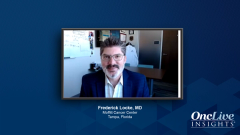
Advancing Lymphoma Treatments: CAR T-Cell and Bispecific Therapies
Discover cutting-edge cellular therapeutics, CAR T-cell therapy, and bispecific strategies for treating lymphoma patients in clinical trials.
Episodes in this series

Video synopsis is AI-generated and reviewed by OncLive editorial staff.
In the realm of lymphoma treatment, cutting-edge cellular therapeutics are redefining the landscape, offering new hope for patients with challenging cases. Beyond the well-known rituximab, one of the most promising approaches in lymphoma treatment is CAR (chimeric antigen receptor) T-cell therapy, which is currently being investigated in a multicenter trial. This therapy is particularly focused on patients with double and triple hit lymphomas, a subset known for its aggressive nature. A prospective randomized trial is underway to evaluate the use of cellular therapeutics in the frontline treatment of lymphoma patients. In this trial, patients with high International Prognostic Index (IPI) scores and/or double or triple-hit genetic rearrangements are initially treated with an R-CHOP [rituximab, cyclophosphamide, doxorubicin, vincristine, and prednisone]-like regimen. After 2 cycles of therapy, response assessment is conducted using PET scans. If the PET scan still shows significant disease activity, patients are transitioned to CAR T-cell therapy. This strategy, employed in an early phase 1 trial, aims to provide more effective treatment for patients who might not respond optimally to standard regimens.
CAR T-cell therapy involves a biological approach to target large cell lymphoma. It leverages the interaction between an antigen, often CD-19 on cancer cells, and an anti-CD3 antibody on T cells . This interaction brings T cells close to cancer cells, facilitating the formation of an immunologic synapse. This allows the T cells to release perforin, create pores in the cancer cells, and unleash granzymes, which trigger a cascade of nucleases that ultimately lead to the digestion of the cancer cell's DNA. Another emerging approach in lymphoma treatment is bispecific antibodies. These antibodies follow a similar strategy, bringing T cells and cancer cells into proximity to enhance T-cell activity and eliminate cancer cells more effectively. Bispecifics are of particular interest in certain patient populations, including those with high IPI scores and patients with cytogenetic abnormalities predictive of poor outcomes.
Overall, these innovative approaches represent a significant shift in the management of lymphoma. They offer new possibilities for patients with challenging lymphoma subtypes, such as double and triple hit lymphomas, who may not respond well to traditional treatments. As clinical trials continue to explore the potential of CAR T-cell therapy and bispecific antibodies, the future of lymphoma treatment holds promise for improved outcomes and a broader range of therapeutic options. In conclusion, the evolving field of cellular therapeutics, including CAR T-cell therapy and bispecific antibodies, is expanding treatment possibilities for lymphoma patients, particularly those with high-risk features or refractory disease. These therapies offer new hope for achieving more effective and precise outcomes in lymphoma management.






































